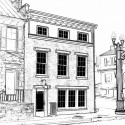 The reception and silent auction to celebrate the completion of the Samuel Noakes House on March 9 is drawing closer. While we count down until March 9, a number of items that will be available at the auction will be highlighted in the PHW blog.
The reception and silent auction to celebrate the completion of the Samuel Noakes House on March 9 is drawing closer. While we count down until March 9, a number of items that will be available at the auction will be highlighted in the PHW blog.
The last item we will highlight in the silent auction is the fabulous Emil J. Paidar barber chair, circa 1940 and still in working condition. The manufacture of “modern” barber chairs can be traced back to shortly after the Civil War. By 1880s, barber chairs could be raised, lowered, reclined and revolved, and in 1900, the familiar hydraulic-operated barber chair was patented.
In 1900 there were two American primary dealers for barber chairs, Emil J. Paidar and Koken. Sources indicate the Emil J. Paidar Company of Chicago, Illinois was the leading company through the 1950s, producing top of the line barber chairs along with other barber shop necessities. The Koken and Paidar chairs were similar in function and price points.
This balance between the barber chair manufacturers lasted until a third competitor arrived on the scene, Takara. Takara, a Japanese company, was expanding their operations overseas in the 1950s. The US Tariff Commission wrote of Takara in 1970:
After World War II a vigorous new barber chair industry grew up in Japan. Through energetic design, sales and advertising campaigns, this industry built up the barber chair market in Japan until it is larger than that of the United States, despite the smaller population of Japan.
Takara produced chairs of almost identical style and function to the Paidar and Koken chairs for substantially less and took advantage of decreasing tariffs to expand their operations in America. Imports increased dramatically in the late 1950s and through the 1960s, supplanting the American-manufactured barber chairs.
In an additional clever move, Takara found another, indirect way to up the competition with the American manufacturers. The Takara chair parts are interchangeable with the Paidar and Koken chairs, so if a piece of an existing chair was broken, it could be replaced with the less costly Takara part.
Takara purchased the struggling Koken company in 1969 and thus obtained 70% of the market for barber chairs in the United States. Paidar appealed to the US Tariff Commission for assistance and/or increased import levies against the foreign competition in 1968 and again in 1970, but to no avail. The Takara Belmont company remains the leading manufacturer today.
To see learn more about Paidar’s rise and fall in the production of barber chairs, visit www.antiquebarberchairs.net and www.usitc.gov.
If you would like to own this piece of history, tickets are still available for both the afternoon and evening reception and silent auction on March 9. Remember, the barber chair will be available only during the evening showing! Reserve your spot online via PayPal, or make your reservation by mailing in a check payable to PHW to 530 Amherst St., Winchester, VA 22601.
 Afternoon Showing, 3-5 p.m. – $20 admission
Afternoon Showing, 3-5 p.m. – $20 admission
Evening Showing, 6-8 p.m. – $30 admission